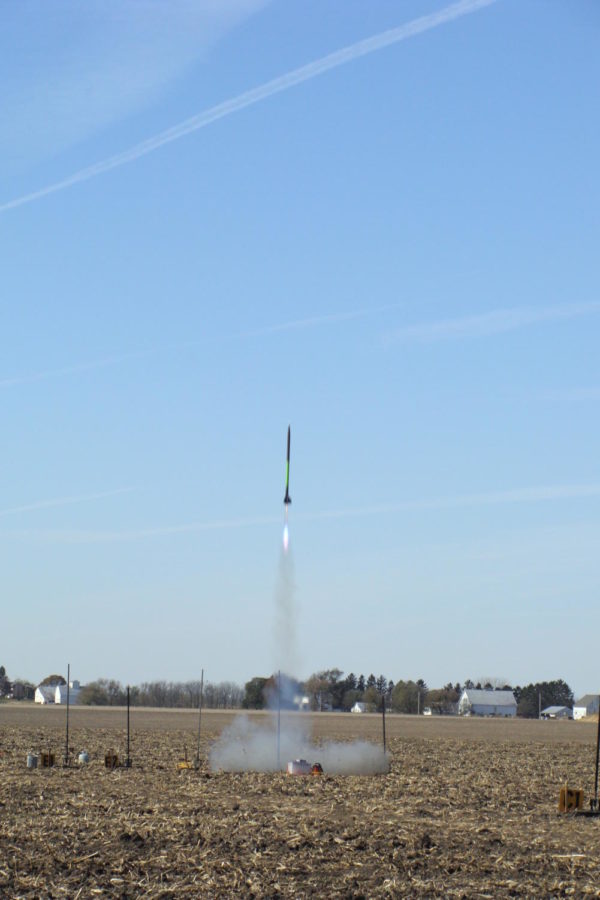Learning goes beyond the classroom
Photo: Rick Hanton/Iowa State Daily
The ISU rockoon group from the Space Systems and Controls Lab launches a test rocket filled with electronics Saturday, Oct. 30 at the Midwest Power rocket launch in Princeton, Ill.
November 8, 2010
I spent a portion of the weekend of Oct. 30 driving 255 miles with two other students to a big amateur rocket launch in Princeton, Ill., where I helped a student project team from Iowa State launch its custom carbon fiber rocket 6,600 feet into the air.
The rocket’s motor ignited on command, spewing a bright blue flame as it pushed for the heavens. As it crested in its parabolic arc, it released its drogue parachute and soon landed nearby in a plowed cornfield. It was all part of a preliminary test of a large cache of electronics hidden within the rocket’s jet-black frame.
That test was one of many practical tests the group has been doing as it builds toward its final goal of launching the rocket from a sounding balloon floating 80,000 feet above our heads.
Such a rocket-balloon combination is known as a “rockoon” in rocketry circles and was first used by Dr. James Van Allen of the University of Iowa in 1952 to study the radiation belts that surround the Earth — which are now known as the Van Allen radiation belts. While enrolled at Iowa State as a student, you can learn tons of definitions, equations and best-practices in the classroom. But it is always an extra benefit to get actual experience in the field — the corn field in this case.
Of course, real-world experience differs from major to major. For engineers, projects like the “rockoon” abound, with students developing race cars, robots, chemically powered vehicles and other electronic and mechanical marvels in their free time.
If you’re not an engineer, there are groups and projects within your college that you can get involved with, too. Students in agriculture might be interested in the groups that evaluate and judge land and soil management. Students specializing in writing might write pieces for sponsored local and national writing contests.
Business majors might spend their time working on or using their entrepreneurial skills or comparing notes on the hottest investments. Whatever your major happens to be, you should follow your passions and spend some of your free time making your learning experience unique.
Employers will reward your time spent to go above and beyond the call of classes and they do realize that practical skills complement theoretical knowledge. As an engineer I can sit and develop computer simulations of our rockoon rocket all day, but without real data and testing with a real rocket, the information I develop is unproven and basically useless.
A major reason that smart engineering groups like Lockheed Martin’s famous advanced Skunk Works division locate their engineers a short walk from the manufacturing floor is to encourage this same kind of hands-on development and testing work. In any future job, if your goal is to move up in the company’s leadership, make sure that you stay well-connected to the people below you. They can help keep your plans and ambitions well-grounded in the requirements of reality.
So if you have some free time in your schedule as you plan out your next semester on AccessPlus, go talk to your adviser, your favorite professor, or one of the many labs on campus — Rockoon is supported by the Space Systems and Controls Lab in Howe Hall — to find a neat project to help with in your free time.
A lot of projects can also provide you with some extra cash or credits in your pocket to help compensate you for your time. Trust me, doing some creative work outside of your class homework takes effort, but it can be very rewarding and in the end will be well worth your time.

















